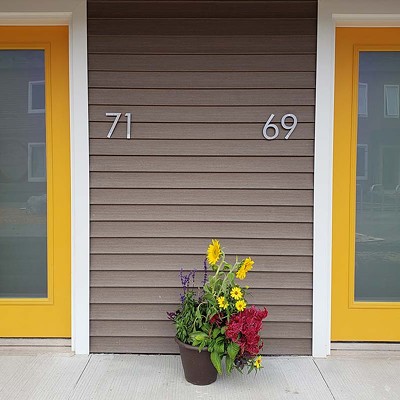Inside Trident Cafe on Hollis, along with the warm smell of fresh roasted coffee, are little reminders written on index cards: “Please take only as many as you need,” above the napkins, “Paper towel ONLY for green bin composting,” in the washroom, and “Garbage only thanks. No compost stuff. No recyclable stuff. Give that to the barista,” above the trash.
Trident’s latest effort to green up their business began in June, when they started serving iced drinks with biodegradable cups, tops and straws. Unlike hot coffee drinks, iced drinks tend to only be served in clear plastic to-go cups. With the popularity of iced cappuccinos and frappuccinos rising, so has the amount of cups piling up in landfills.
Hudson Shotwell, owner of Trident Cafe, realized the environmental impact of these cups and figured biodegradable cold cups were an easy solution to a big problem. “We just hate the idea of plastic sitting in landfills for thousands of years. It’s as simple as that.”
The cups are made from an organic plastic (PLE) made from corn. Traditional plastic (PET) comes from petroleum, which makes it non-renewable and non-biodegradable. The corn cups compost in 45 days, are odorless and non-allergenic, and are indistin- guishable from the traditional plastic cups.
Biodegradable cold cups have yet to arrive at other coffee houses in Halifax. At Just Us! Coffee, the focus has been on finding the holy grail of biodegradable products: the compostable hot cup. As a result, cold cups were placed on the backburner until
recently.
“We wanted to focus on what we are predominantly selling, which is hot cups,” says Frank Harris, Wolfville’s Just Us! cafe manager. “So we figured let’s get rid of the big one first.”
Biodegradable hot cups are available, but they tend to leak; the corn lining isn’t as heat resistant as the traditional petroleum lining. Both Trident and Just Us! have tested different hot cup suppliers for the past couple of months, and Just Us! recently put in their first order for biodegradable hot cups for all of their cafes.
Tim Horton’s believes the cold cup solution lies elsewhere. Diane Slowpek-Weber, Tim Horton’s director of corporate communications, says it’s up to Halifax’s recycling facilities to solve the problem. The #6 plastic cups used for drinks like the iced cappuccino are recyclable in most of the province, but not in Halifax.
According to Jim Bauld, Halifax’s solid waste resources communications coordinator, recycling #6 cups isn’t a possibility until at least 2008. “There are two aspects we have to consider,” he says, “finding a long term, steady, stable market for the recyclables, and the financial implications of including them.”
Simple economics have held back the corn cups as well. Each corn cup costs Trident an extra five to seven cents more than the traditional cold cups. For some small cafes, that can be five to seven cents too much.
“For us, it’s like paying more doesn’t hurt the business,” says Shotwell. “It’s actually good for business, because people appreciate it.”
Some environmentalists aren’t as appreciative of the adoption of corn-based products. Combined with the ethanol (fuel derived from corn) push, the biodegradable plastic industry could have its own negative effect on the environment.
“I’m concerned about any kind of mass produced product that’s dependent on corn,” says Charlene Boyce-Young, Clean Nova Scotia’s communications coordinator. “Growing corn uses tons of water, lots of pesticides and introduces a potentially dangerous amount of nitrates into our groundwater.”
Nova Scotia can’t even produce enough corn for livestock, let alone biodegradable products. According to AgriPoint, 72 percent of our corn is imported. Shotwell has to order his corn cups from Indiana, making him dependent on fossil fuels.
Shotwell agrees with Boyce-Young. The corn cups are a band-aid solution, not a cure.
“It’s a kind of experiment to get people to make the connection between what they’re doing and what’s going on in the environment,” he says. “What would be ideal is if people would stop using these stupid to-go cups and sit in with their drink.”











